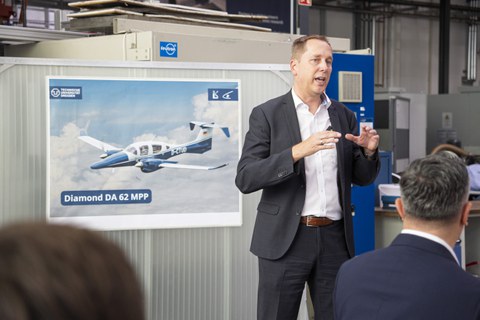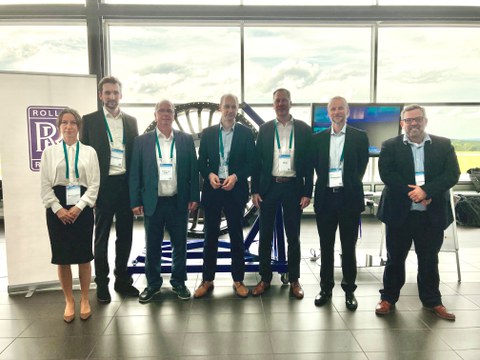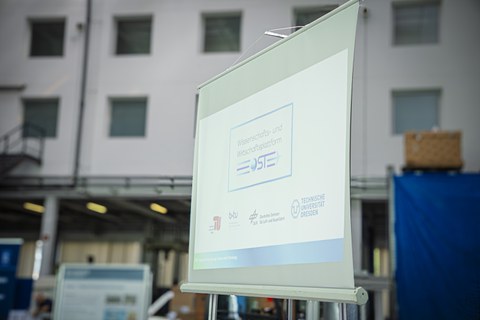Sep 15, 2025
What does climate-friendly aviation of tomorrow look like?

ILK board member Prof. Maik Gude giving a lecture on the 19th German Aerospace Day.
At the 19th German Aerospace Regions Day in Dresden, this question was not answered in abstract terms but in very concrete ways. One example was the introduction of a new joint research aircraft of the Institute of Lightweight Engineering and Polymer Technology (ILK) and the Institute of Aerospace Engineering (ILR) at the TU Dresden, which is set to explore exactly this question.
Prof. Maik Gude, board member of ILK, presented the research aircraft Diamond Aircraft DA62 MPP to visitors at the Lightweight Innovation Center (LIZ) of the ILK in a dedicated lecture. The aircraft is currently under production and will serve as a flying laboratory for fossil-free propulsion technologies and modern sensor systems. Several technologies can be tested simultaneously under real flight conditions.

Prof. Maik Gude (ILK), Dr. Sebastian Spitzer (ILK), and the Rolls-Royce team at the 19th German Aerospace Day.
In parallel, the ILK was also represented by Prof. Gude and Dr. Sebastian Spitzer (ILK) together with Rolls-Royce Deutschland Ldt & Co KG at Dresden Airport. At their joint booth, the partners presented the results of a completed UTC Dresden project: a lightweight component in titanium-CFRP hybrid design. For one of the largest and heaviest static engine components, a weight reduction of around 20 percent was achieved. The project illustrates the contribution that innovative lightweight structures can make to the efficiency and sustainability of propulsion systems.

Science and Industry Platform OST
The event also provided space for an intensive exchange within the sector on the current state of aerospace as well as shared perspectives for the future. Initiatives such as FoFlu and partnerships like the science and business platform for climate-friendly engines and their mission-oriented integration OST4Aviation, involving institutions such as DLR in Cottbus and Dresden, TU Berlin and BTU Cottbus-Senftenberg, demonstrate how TU Dresden is actively contributing to the development of climate-friendly aviation solutions and driving forward pioneering projects.
With the DA62 MPP, not only a technical laboratory is taking shape but also a symbol of the strong connection between research, industry, and academia. The research aircraft will significantly expand ILK’s future work and open new opportunities for the testing of innovative propulsion technologies. The question of climate-friendly aviation no longer remains up in the air. It will soon be researched in flight.
